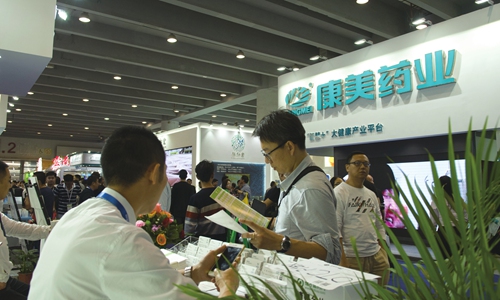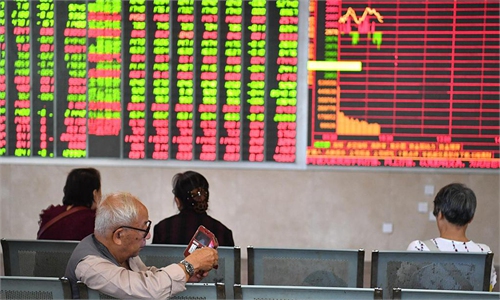Heavy fines levied on Kangmei Pharmaceutical trigger ‘resignation wave’ of independent directors in Chinese bourses

A Kangmei Pharmaceutical booth at an exhibition FilePhoto: IC
A "resignation wave" of independent directors has been in the spotlight across the A-share market recently, after heavy fines levied on five directors of Kangmei Pharmaceutical Co.
Since November 12, there have been at least 17 listed companies which have disclosed the resignation of independent directors.
Independent directors refer to directors who are independent of the company's shareholders and who do not serve within the company, have no important business or professional connections with the company or company managers, and make independent judgments on company affairs.
The number is higher than previous months, with the resignation number of independent directors of 31 and 36 in September and October respectively.
It is widely believed that the spike is connected to fines handed out to independent directors following the high-profile Kangmei Pharmaceutical's financial fraud case.
The Global Times earlier this month reported that in a historic verdict, the Intermediate People's Court of Foshan, South China's Guangdong Province publicly released a ruling on a securities market manipulation case involving 12 individuals including Ma Xingtian, the former chairman and general manager of Kangmei Pharmaceutical, a drug maker that had massively inflated its financial performance, in what is being called one of the worst accounting scandals in A-share market history.
Ma was sentenced to 12 years in prison and fined 1.2 million yuan ($187,900) for the crime including manipulating the securities market, illegal disclosure or non-disclosure of important information, and bribery, according to the court, according to media reports.
Kangmei's five independent directors are each liable for between 5 percent and 10 percent of the fraudulent amount, equivalent to 123 million yuan to 246 million yuan, according to an exchange filing.
However, the penalty is much higher than what they earned, with annual director fees from the firm
It is worth noting that wages in the entire industry are generally not high. Financial data provider Wind shows that among the independent directors of A-share listed companies, only more than 4,000 have an annual salary above 100,000 yuan, accounting for less than 30 percent. Data revealed there are even some independent directors take an annual salary of between 300 to 500 yuan.
Market watchers said that low salaries with high levels of liability are the main reason why independent directors have recently resigned, especially following the Kangmei Pharmaceutical case.
This Kangmei Pharmaceutical case has awakened the real awareness for all parties, including companies, investors and independent directors themselves that they hold an obligation to fully fulfill their responsibilities and follow the rules, Dong Shaopeng, a senior research fellow at the Chongyang Institute for Financial Studies at Renmin University of China told the Global Times on Tuesday.
Independent directors' dilemma
Setting up the position of independent directors can be traced back as early as in 1993, when Tsingtao Brewery, the mainland brewer realized Hong Kong and Shanghai's listings, which hired two independent directors, marking the first domestic listed company to use the independent director model.
In 2001, the China Securities Regulatory Commission issued a guideline for setting up the independent director system.
The regulations state that independent directors shall not hold positions other than directors in the company, and they have no relationship with the listed company and their major shareholders that may prevent them from making independent and objective judgments.
Independent directors shall take reasonable measures to ensure the legal rights and interests of small and medium shareholders not being harmed, the rules said.
Such regulations note that independent directors should understand the company's business and financial position, and not be influenced by the interests of the company's management, and help the secondary market to re-supervise listed companies in addition to the accounting firm and the board of supervisors.
However, the independent director system has been subject to controversy over the past 20 years in China.
In the current system of nomination and appointment of independent directors, the nomination is mainly controlled by the board of directors, the board of supervisors, and shareholders who individually or collectively hold more than 1 percent of the company's issued shares, instead of the individual shareholders.
Media reports suggest that the independent directors of most listed companies are hired by major shareholders or management based on personal relationships. To a certain extent, those who should be responsible for supervision and being supervised have become the same group of people, according to financial news outlet hongzhoukan.com.
Statistics show that about 90 percent of independent directors work less than 20 days for per listed company each year. Excluding the time spent in general meetings and the board of directors, 77.33 percent of independent directors work for less than 8 days, according to financial news outlet jrj.com.cn.
Market watchers said it is a right time for the market to rethink where the independent director model is heading, stating the market is at a "crossroads."
Dong predicted that although there will be a short-term trend toward independent directors quitting their posts, the impact of the Kangmei case on listed companies is far-reaching, and will prompt the listed companies to reflect on and improve their internal management of independent directors.

